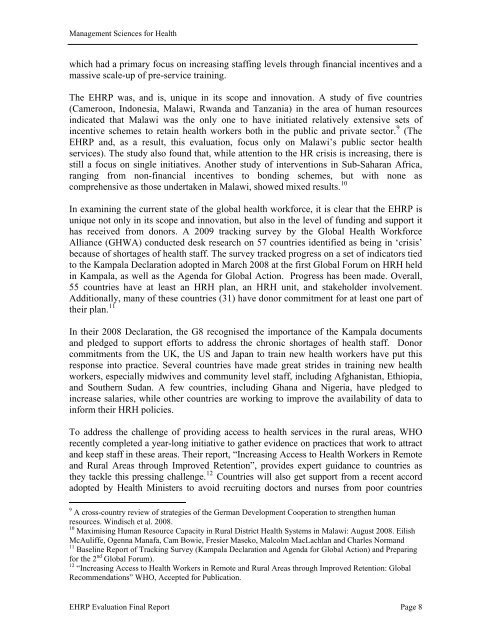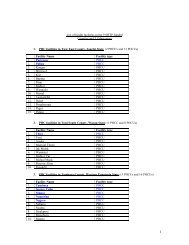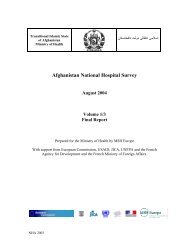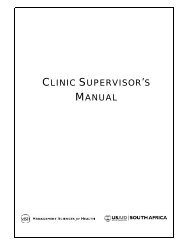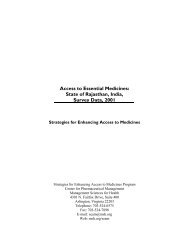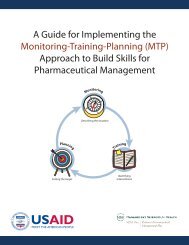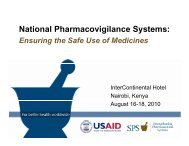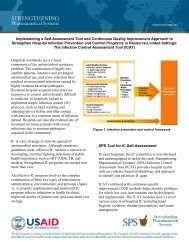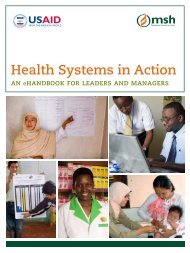Evaluation of Malawi's Emergency Human Resources Programme
Evaluation of Malawi's Emergency Human Resources Programme
Evaluation of Malawi's Emergency Human Resources Programme
You also want an ePaper? Increase the reach of your titles
YUMPU automatically turns print PDFs into web optimized ePapers that Google loves.
Management Sciences for Health<br />
which had a primary focus on increasing staffing levels through financial incentives and a<br />
massive scale-up <strong>of</strong> pre-service training.<br />
The EHRP was, and is, unique in its scope and innovation. A study <strong>of</strong> five countries<br />
(Cameroon, Indonesia, Malawi, Rwanda and Tanzania) in the area <strong>of</strong> human resources<br />
indicated that Malawi was the only one to have initiated relatively extensive sets <strong>of</strong><br />
incentive schemes to retain health workers both in the public and private sector. 9 (The<br />
EHRP and, as a result, this evaluation, focus only on Malawi’s public sector health<br />
services). The study also found that, while attention to the HR crisis is increasing, there is<br />
still a focus on single initiatives. Another study <strong>of</strong> interventions in Sub-Saharan Africa,<br />
ranging from non-financial incentives to bonding schemes, but with none as<br />
comprehensive as those undertaken in Malawi, showed mixed results. 10<br />
In examining the current state <strong>of</strong> the global health workforce, it is clear that the EHRP is<br />
unique not only in its scope and innovation, but also in the level <strong>of</strong> funding and support it<br />
has received from donors. A 2009 tracking survey by the Global Health Workforce<br />
Alliance (GHWA) conducted desk research on 57 countries identified as being in ‘crisis’<br />
because <strong>of</strong> shortages <strong>of</strong> health staff. The survey tracked progress on a set <strong>of</strong> indicators tied<br />
to the Kampala Declaration adopted in March 2008 at the first Global Forum on HRH held<br />
in Kampala, as well as the Agenda for Global Action. Progress has been made. Overall,<br />
55 countries have at least an HRH plan, an HRH unit, and stakeholder involvement.<br />
Additionally, many <strong>of</strong> these countries (31) have donor commitment for at least one part <strong>of</strong><br />
their plan. 11<br />
In their 2008 Declaration, the G8 recognised the importance <strong>of</strong> the Kampala documents<br />
and pledged to support efforts to address the chronic shortages <strong>of</strong> health staff. Donor<br />
commitments from the UK, the US and Japan to train new health workers have put this<br />
response into practice. Several countries have made great strides in training new health<br />
workers, especially midwives and community level staff, including Afghanistan, Ethiopia,<br />
and Southern Sudan. A few countries, including Ghana and Nigeria, have pledged to<br />
increase salaries, while other countries are working to improve the availability <strong>of</strong> data to<br />
inform their HRH policies.<br />
To address the challenge <strong>of</strong> providing access to health services in the rural areas, WHO<br />
recently completed a year-long initiative to gather evidence on practices that work to attract<br />
and keep staff in these areas. Their report, “Increasing Access to Health Workers in Remote<br />
and Rural Areas through Improved Retention”, provides expert guidance to countries as<br />
they tackle this pressing challenge. 12 Countries will also get support from a recent accord<br />
adopted by Health Ministers to avoid recruiting doctors and nurses from poor countries<br />
9<br />
A cross-country review <strong>of</strong> strategies <strong>of</strong> the German Development Cooperation to strengthen human<br />
resources. Windisch et al. 2008.<br />
10<br />
Maximising <strong>Human</strong> Resource Capacity in Rural District Health Systems in Malawi: August 2008. Eilish<br />
McAuliffe, Ogenna Manafa, Cam Bowie, Fresier Maseko, Malcolm MacLachlan and Charles Normand<br />
11<br />
Baseline Report <strong>of</strong> Tracking Survey (Kampala Declaration and Agenda for Global Action) and Preparing<br />
for the 2 nd Global Forum).<br />
12<br />
“Increasing Access to Health Workers in Remote and Rural Areas through Improved Retention: Global<br />
Recommendations” WHO, Accepted for Publication.<br />
EHRP <strong>Evaluation</strong> Final Report Page 8


